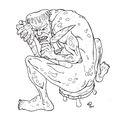Template:Selected anniversaries/February 11: Difference between revisions
No edit summary |
No edit summary |
||
| Line 7: | Line 7: | ||
||1144: The Hellenistic science of alchemy entered medieval Europe by way of the Islamic empire. In his translation of Liber de compositione alchemiae (Book about the composition of alchemy) Robert of Chester wrote the following: "I have translated this Book because, what alchemy is, and what its composition is, almost no one in our Latin [that is: Western] world knows. finished February 11th anno 1144." From a blog at *RMAT https://pballew.blogspot.com/2019/02/on-this-day-in-math-february-11.html | ||1144: The Hellenistic science of alchemy entered medieval Europe by way of the Islamic empire. In his translation of Liber de compositione alchemiae (Book about the composition of alchemy) Robert of Chester wrote the following: "I have translated this Book because, what alchemy is, and what its composition is, almost no one in our Latin [that is: Western] world knows. finished February 11th anno 1144." From a blog at *RMAT https://pballew.blogspot.com/2019/02/on-this-day-in-math-february-11.html | ||
File:Giovanni Antonio Magini.jpg|link=Giovanni Antonio Magini (nonfiction)|1617: Mathematician, cartographer, and astronomer [[Giovanni Antonio Magini (nonfiction)|Giovanni Antonio Magini]] dies. | File:Giovanni Antonio Magini.jpg|link=Giovanni Antonio Magini (nonfiction)|1617: Mathematician, cartographer, and astronomer [[Giovanni Antonio Magini (nonfiction)|Giovanni Antonio Magini]] dies. Mangini supported a geocentric system of the world, and defended the use of astrology in medicine, but also made practical contributions to mathematics and physics. | ||
File:Culvert Origenes.jpg|link=Culvert Origenes|1618: Writer and alleged troll [[Culvert Origenes]] publishes his essay ''[[Man's inhumanity to man (nonfiction)|Man's Inhumanity to Man]]'', which will profoundly influence three generations of Enlightenment-era thinkers. | File:Culvert Origenes.jpg|link=Culvert Origenes|1618: Writer and alleged troll [[Culvert Origenes]] publishes his essay ''[[Man's inhumanity to man (nonfiction)|Man's Inhumanity to Man]]'', which will profoundly influence three generations of Enlightenment-era thinkers. | ||
Revision as of 17:51, 11 February 2020
1617: Mathematician, cartographer, and astronomer Giovanni Antonio Magini dies. Mangini supported a geocentric system of the world, and defended the use of astrology in medicine, but also made practical contributions to mathematics and physics.
1618: Writer and alleged troll Culvert Origenes publishes his essay Man's Inhumanity to Man, which will profoundly influence three generations of Enlightenment-era thinkers.
1650: Mathematician and philosopher René Descartes dies. He is remembered as the father of modern Western philosophy.
1760: First known use of Japanese rod calculus to detect and prevent crimes against mathematical constants.
1847: Inventor, engineer, and businessman Thomas Edison born. He will develop the light bulb and the phonograph, among other inventions.
1884: Set theorist and crime-fighter Georg Cantor saves Edward Lear from attack by math criminals.
1898: Physicist and academic Leo Szilard born. He will conceive the nuclear chain reaction in 1933, and patent the idea of a nuclear reactor with Enrico Fermi.
1930: Mathematician, statistician, and crime-fighter Oskar Anderson publishes new theory of mathematical statistics based on Gnomon algorithm functions with applications in the detection and prevention of crimes against mathematical constants.
1931: Engineer and inventor Charles Algernon Parsons dies. He invented the compound steam turbine, and worked on dynamo and turbine design, power generation, and optical equipment for searchlights and telescopes.
- Charles Critchfield ID badge.gif
1944: Mathematical physicist and crime-fighter Charles Critchfield uses burst of neutrons to detect and prevent crimes against physical constants.
1973: Nuclear physicist and Nobel Prize laureate J. Hans D. Jensen dies. He shared half of the 1963 Nobel Prize in Physics with Maria Goeppert-Mayer for their proposal of the nuclear shell model.
2019: Wheel of Fire 2 is voted Picture of the Day by the citizens of New Minneapolis, Canada.











